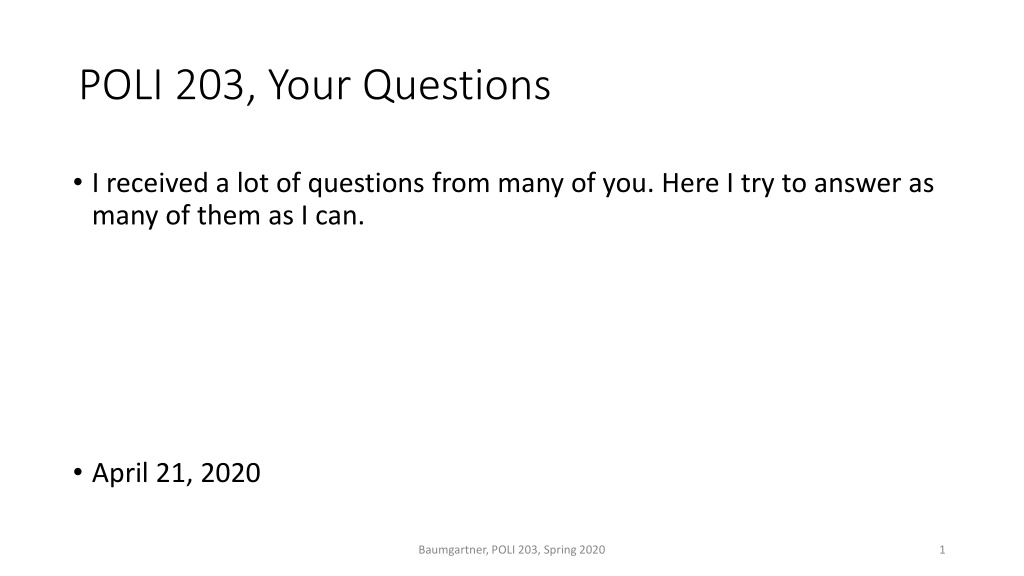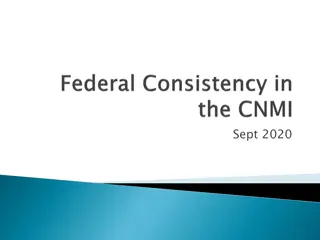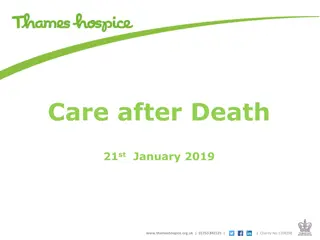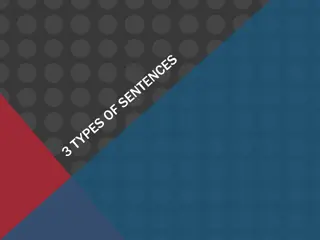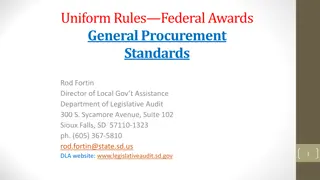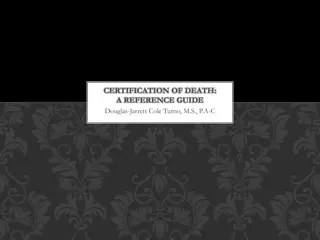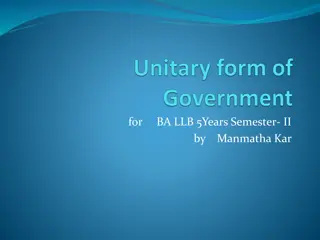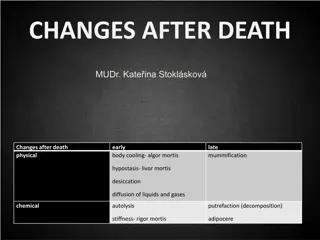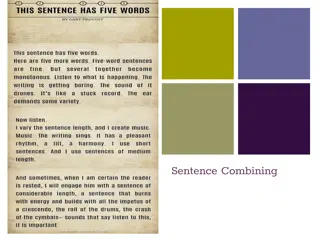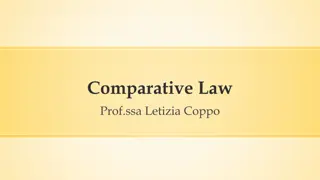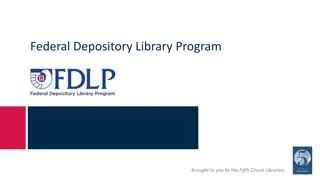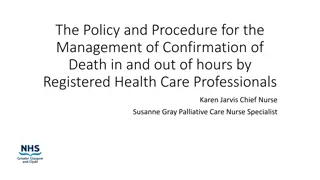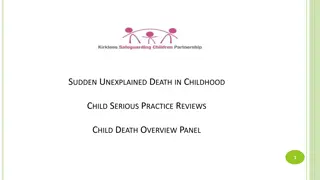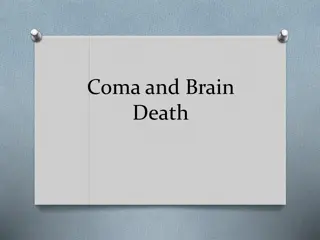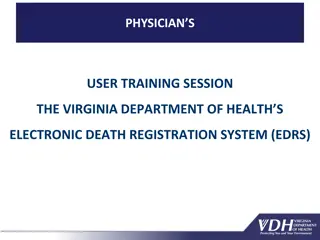Understanding Differences Between Federal and State Death Sentences
Exploring the absence of executions in North Carolina from 1976 to 1984, this analysis delves into factors affecting the resumption of executions and the history of death penalty sentencing in the state. Additionally, it distinguishes federal and state death sentences, shedding light on the distinctions between the two types of convictions.
Uploaded on Nov 15, 2024 | 0 Views
Download Presentation

Please find below an Image/Link to download the presentation.
The content on the website is provided AS IS for your information and personal use only. It may not be sold, licensed, or shared on other websites without obtaining consent from the author. Download presentation by click this link. If you encounter any issues during the download, it is possible that the publisher has removed the file from their server.
E N D
Presentation Transcript
POLI 203, Your Questions I received a lot of questions from many of you. Here I try to answer as many of them as I can. April 21, 2020 Baumgartner, POLI 203, Spring 2020 1
Announcements and catch-up Please see the class web site for a clarifying memo about how your grades will be calculated. It s similar to what was in the syllabus at the beginning of the semester, but slightly different. So for the sake of transparency, I made up a memo that describes the differences. I also paste it here in the next slide. Other announcements: See the Netflix series The Innocence Files currently all over Netflix. Baumgartner, POLI 203, Spring 2020 2
Updated after POLI 203 Grading Calculations Assignment Attendance and active participation in your discussion sections A five-page (1500 word) paper on a particular aspect of the book you read in section, as assigned by your TA A five-page (1500 word) paper focusing narrowly on a particular element of the death penalty, with approval of your TA (revised assignment is 7.5 pages, 30 percent of grade) Active participation in the development of a group presentation to the main class lecture, again as assigned by your TA (this part of the course was cancelled, replaced by longer paper above) Occasional quizzes in lecture (these quizzes have been regular since return from Spring break; there will be six) Attendance at the speakers events (Note: grades are based on how many events you missed, with 2 misses bringing a 5 point reduction and 3 misses bringing a loss of all 10 points. No one will be marked absent for the events that were cancelled.) Final exam Final exam, Part A, five quizzes, 10 questions each, to be done between April 27 and 3pm May 5 (50% of the final) Final exam, Part B, two additional posts to your Sakai forums, due April 24 (30% of the final, graded credit / no credit) Final exam, Part C, narrative response to a prompt provided on May 4 and due by 3pm on May 5 (20 percent of the final, graded credit / no credit) Original Plan Percent Covid Percent 10 10 20 20 20 30 10 0 10 10 10 20 10 10 6 4 Total 100 100 Baumgartner, POLI 203, Spring 2020 3
Is there a reason there were no executions in North Carolina from 1976 to 1984? US executions came back in 1977, but that inmate, Gary Graham, was a volunteer. Generally speaking, executions were pretty slow to come back in any state, and NC was not unusual. You have to allow the person to exhaust all their appeals. Also, recall that no one sentenced before Woodson remained eligible, so it all started over with those sentenced under the new law, post 1976. So, really, 1984 was a pretty quick start. Also note, NC sentenced over 500 people to death, but carried out just 43 executions. And all those were in a short period, really, in the late 1990s and early 2000 s Baumgartner, POLI 203, Spring 2020 4
Federal v. state death sentences How do federal and state death sentences differ? The vast bulk of the criminal justice system is a state matter. So, federal crimes would be things like killing a federal judge or committing a crime on federal lands. It s really pretty rare. Another difference: you ll get a better lawyer! Does a federal death sentence carry more weight? Nope. Dead is dead. But like CA and PA, the feds rarely carry them out. How does one get sentenced to death by the federal government? See above, most crimes are state-related. You have to commit a crime on federal land, kill an FBI agent or a federal judge or federal corrections officer, something like that. (Or a park ranger!) Can a person receive a federal death sentence for a crime that was committed in a state that abolished the death penalty? Oh, yeah! And in Puerto Rico, you could be tried federally in English with no translator! Baumgartner, POLI 203, Spring 2020 5
How does capital punishment in the U.S. differ from capital punishment in other countries? We have it, they don t! Garland, David. 2012. Peculiar Institution: America s Death Penalty in an Age of Abolition. Cambridge: Harvard University Press. Describes how for European countries, the development of the monarchy (1600 s, 1700s) corresponded with centralizing this power to kill. In the US it was never centralized. We were / are one of the few western countries where it was local authorities who did it. This may be why we still have it, according to Garland. I think he may be right. The powerful response to Furman would not have happened if it had not been seen as a threat to states rights and the southern way of life Baumgartner, POLI 203, Spring 2020 6
Military death penalty Page 330 of Deadly Justice mentions that the U.S. military has an active death penalty statute. Could you elaborate on this? Was the military's death statute affected by the rulings in Furman or Gregg? Yes, it was abolished just like all the others How does it differ from state or federal death sentences? Fewer rights to the accused in the military court system. Extremely few cases. No military executions since Furman. If someone in the military is convicted of capital murder, who will execute them? (Ex. If Jeffrey MacDonald was sentenced to death, would the military be responsible for his execution?) No, if they kill a civilian they ll be charged in regular civilian courts, generally speaking. They d have to be charged and convicted of a military crime (treason?) or a crime on a military base for the military justice system to be involved. There was a case from Fayetteville where a soldier killed someone and when it was overturned in the civilian courts the military moved to charge him. But this is rare. Baumgartner, POLI 203, Spring 2020 7
Collateral Damage and the death penalty Page 342 refers to Robert Bohm and the costs the death penalty imposes on individuals other than the inmate. Could you also elaborate on this? (Any stats associated with Bohm's research, cases he used for his info, etc.) See the new film, Clemency, just out, with Alfre Woodard playing the role of the warden in charge of administering executions and overseeing a prison with death row. All kinds of psychological issues for staff. Bohm s point is that we spread responsibility to many people: jurors, judges, DA s, defense attorney s, other professionals, witnesses, corrections officers, and also harm to others such as family and friends of the inmate. There s not a lot of research on this, really. Baumgartner, POLI 203, Spring 2020 8
Some of Bohms published works to look at, especially the 2013 book. Bohm, Robert M. 1987. American Death Penalty Attitudes: A Critical Examination of Recent Evidence. Criminal Justice and Behavior 14, 3: 380 396. Bohm, Robert M. 2012. Deathquest: An Introduction to the Theory and Practice of Capital Punishment in the United States. 4th ed. Waltham, MA: Anderson Publishing. Bohm, Robert M. 2013. Capital Punishment s Collateral Damage. Durham, NC: Carolina Academic Press. Bohm, Robert M., Louise J. Clark and Adrian F. Aveni 1991. Knowledge and Death Penalty Opinion: A Test of the Marshall Hypothesis. Journal of Research in Crime and Delinquency 28, 3: 360 387. Baumgartner, POLI 203, Spring 2020 9
Separate and unrelated to the class: What is the most interesting thing you've learned about capital punishment? My top few: 70 percent reversal rate. What the ? Most scheduled execution dates are cancelled. Wow Figure 10.4 in the book: most lethal injections involve low levels of tranquilizers. In general, I had no particular positive view on this particular aspect of the world of criminal justice. But I have been shocked at the hatred and the raw emotion that comes in dehumanizing people accused of crimes. That, and the completely random, capricious elements of it. Oh, and the tidal wave of homicides we have in our country. I knew that, but never really thought about just how often they happen. And how it s inevitable that the CJ system has to classify these into levels of bad. But they are all bad. I could go on! There are so many shocking things! Baumgartner, POLI 203, Spring 2020 10
Covid-19 and prison Secondly, with the covid outbreak, I was wondering if you knew any information or experiences of social distancing, self-quarantining, or just general sanitization for inmates. Are any of the recommendations made by the CDC being carried out? I understand that many prisons have limited visitor access; what does that mean for those who have in-person meetings with their lawyers? For upcoming executions? Jails, prisons, juvenile detention centers, old-folks homes, homeless shelters, college dorms, nursing homes, all these are dangerous Lots of executions are being delayed, actually. Lawyer visits a big problem. Significant danger of death in prison, and a real dilemma about whom to release. Also, obviously they will not release the death row inmates, but how to keep them safe? Lyle May, others, have called and said they are basically terrified. Baumgartner, POLI 203, Spring 2020 11
I was wondering how exactly you got into this line of work and what prompted you to being research and write Deadly Justice? I published a bunch of work on how issues get framed and how policies change. That s really what I m known for in political science. See this book and check out its Google scholar citations. (I m not bragging, but it s a biggie!) haha. Baumgartner, Frank R., and Bryan D. Jones. 1993. Agendas and Instability in American Politics. Chicago: University of Chicago Press. I got a phone call in 2000 from a policy advocate in DC who had read that book while he was in his PhD program in Pol Sci. He said: Our issue is the death penalty, and we re pushing the frame that it s a government program run by bureaucrats, therefore prone to cost-overruns, inefficiencies, and mistakes. I designed a project to study that particular issue and published a book on the topic in 2008. Since then I can t get myself away from it, and I ve done more on other criminal justice and race issues, even as I continue the other stuff. So now I have a track of my research that is much more hands-on. Baumgartner, POLI 203, Spring 2020 12
Policy analysis, policy change, and political science I am very interested in researching statistics or creating data to be used for analysis such as, collecting data for crimes to determine who has received the death penalty in relation to the offender s and victim s race. I am also interested in analyzing policies in place using similar tools, such as being able to prove or disprove the effect of deterrence with data from the US and compare it to other countries. In addition to this analysis, I am interested in creating plans for changing policies in place that are no longer functional or need to be improved. I was also curious as to whether you consider the analysis/change of policies and what I previously described as a political science major or public policy major topic? That s what I study. But it s more public policy. In most universities, public policy is a subfield of political science at the undergraduate level. Here at UNC, it s more in the public policy department. I m in both departments for this reason. Baumgartner, POLI 203, Spring 2020 13
Lastly, I was wondering if you recommend or know of any courses similar to Poli 203 in regards to teachings about the prison system/criminal justice system and analyzing policies and statistics that surround both? We don t have a Criminology Department; that s at NC State. Seth Kotch in American studies. Race, ethnicity, identity studies courses. Public policy and political science courses where we analyze policy change (e.g., my course on Framing Public Policies, poli 421) Research-related classes where you can use statistics to study any topic you like, and you pick a criminal justice policy. Be creative. Baumgartner, POLI 203, Spring 2020 14
LWOP What kind of crimes are LWOP eligible? Is it the same as capital eligible crimes or is it more widespread to more "garden variety" crimes since it is considered more humane than the death penalty? Why is it considered more "ethical" and humane than the death penalty- isn't the convicted person going to be killed by the state while in prison either way? 1st degree murder; sometimes 2nddegree; sometimes 3 strikes or habitual felon there was a real punishment inflation in the 1980s and 1990s when we made these laws. Paradox / Faustian bargain: the availability of LWOP has been helpful in creating a decline in death sentences. But it s also a death sentence. I m doing some research attempting to document how many elderly people will soon be in prison. I hope this might change the frame and change these policies. Baumgartner, POLI 203, Spring 2020 15
How can we write to Lyle May or other DR inmates? Go to this page and note the inmate number: https://www.ncdps.gov/adult-corrections/prisons/death- penalty/death-row-roster Write a letter addressed in this manner, and just change the name and inmate number: Lyle C May 0580028 4285 MSC Raleigh NC 27699-4285 Be prepared to get a letter back, and to have a continuing correspondence. People in prison are like in a time warp. Time is slow, and the postal service, not texting, determines the turn-around time. (Also note the prison may read your mail.) Baumgartner, POLI 203, Spring 2020 16
The death penalty is so obviously flawed why do we still have it? It is clear that the death penalty in the United States, to say the least, has room for improvement. Even after a ruling such as McCleskey v. Kemp that essentially said patterns of racial discrimination were irrelevant and inevitable, how has the US Supreme Court continued to ignore that? Has the USSC addressed issues specifically regarding the constitutionality of the death penalty within the past couple of years? It seems that concerns about the death penalty are at the forefront of the agenda for some states such as California (with the governor's recent decision to call a moratorium) and Colorado (which just abolished) but what debates are currently happening on a national level? Well, you need to recognize some people are just never going to go there. They might argue, for example, that the value of retribution is so great that no number of wrongful executions would outweigh it. For example, Justice Scalia wrote that 40,000 people die every year on the highways, but we still allow driving. At the national level, the current administration is attempting to re-start the death penalty. The 2016 election made a big difference, and the 2020 election will as well! Baumgartner, POLI 203, Spring 2020 17
With you having personally done extensive and lengthy research on the death penalty, what are some of the greatest advancements or setbacks you've noticed in regard to reforms on capital punishment? Advances: chipping away at the numbers, advancing the evolving standards argument. Progressively eliminating the death penalty for juveniles, those with low IQ, perhaps next for those with serious mental illness Setbacks: McCleskey is just astounding. And jury bleaching has been so rampant. But I m optimistic that people have made the case that jury bleaching is wrong and that s coming around. Lots of good changes I think in terms of how the death penalty is understood. Thurgood Marshall was right: the closer you look, the more you learn about it, the uglier it seems. Baumgartner, POLI 203, Spring 2020 18
On-again, off-again = torture? One question my students keep coming back to concerns the constitutionality of repeated scheduling and cancelling of execution dates. Could you review this argument, that the death penalty might be unconstitutional because the "off-and-on-again" process? Are there prominent cases where state/federal or the Supreme Court ruled on this issue? Is this still something that anti-death penalty activists mobilize around? The US SC has never ruled that this is torture. That does not mean it is not torture or that they would not recognize it if presented with different evidence. So I think one has to make the case, prove the point with evidence, show how it indeed is torture. This is a struggle and it has never been done. Also, others will counter-argue that many of the delays and cancellations stem from actions of the defense. (Of course that means the solution to the issue of torture is to accept your execution date and drop all appeals, which means give up your constitutional rights ) I think it s clearly torture. But that s not the law. The law says it s fine. Baumgartner, POLI 203, Spring 2020 19
Human cost of sitting on a jury Are you aware of any studies, if any, that have been done focusing on the effects serving on a jury for a capital trial can have? Do jurors remain "death-qualified" after sitting through a sentencing phase of a capital trial or do opinions change? Good book here: Sundby, Scott E. 2005. A Life and Death Decision: A Jury Weighs the Death Penalty. New York: Palgrave. The Capital Jury Project: http://americanradioworks.publicradio.org/features/deadlydecisions/capitalj ury.html They have been interviewing those who served. Lots of good stuff here. Probably I need to incorporate more of their work for the next edition of Deadly Justice! It would be case-by-case, but imagine sitting on a jury where you find out you made a mistake! Healing Justice is working with some such jurors. Baumgartner, POLI 203, Spring 2020 20
What can I do? I read Just Mercy by Bryan Stevenson the summer after my senior year in high school, and it was a large part of my decision to major in Political Science and pursue a career in law. Now, after finishing Deadly Justice, The Death of Innocents,and in the middle of reading Ghost of the Innocent Man, I'm left wondering after all of this I've learned, and continue to learn, what can I do now? As you've mentioned before, we are all impacted by the laws that govern us and the decisions that our government officials make even if we don't see it on the day to day, so I would love any advice you may have on how, after being a student in this class, we can act on the information we now have about our criminal justice system? Choose a career where you do more good than harm! Always ask: is this choice (e.g., voting, taxes, any policy choice) helping improve, or will it make things worse? Get involved in public service. Pay attention to local elections such as DA and Sheriff, not only national politics. While in school, study hard so that you are smarter and better trained than the person on the other side. Don t feel the responsibility to fix the entire system, single-handedly, right now. Be prepared to participate in a long struggle. After all, when you fix one element, you ll want to move on to the next issue. There are many inadequacies in public life, too many for one person! Baumgartner, POLI 203, Spring 2020 21
Rescheduling things you missed Can we reschedule the prison tours? Yes, next year Can we reschedule the speakers events? Yes, next year Obviously, everything is up in the air in terms of when things will come back. But I m glad to re-schedule all the speakers that we missed, and I know they would like to come. It won t be associated with the class, just open to the public. And, in Spring 2022, I ll do this class again. Baumgartner, POLI 203, Spring 2020 22
Cramming for the final: Can you review the most important US SC cases we need to know? McGautha Furman Gregg McCleskey Brady Batson Atkins Roper And don t forget the Amendments to the Constitution. Baumgartner, POLI 203, Spring 2020 23
More information on life after exoneration Good point. Look at the website of Healing Justice, Jennifer s organization. https://healingjusticeproject.org/ It s like one tragedy after another. So few services are made available, and people have real needs. Very few have compensation. Those that do find that it does absolutely nothing to heal what has been harmed, such as lost time with family Baumgartner, POLI 203, Spring 2020 24
Current events (as they relate to the death penalty) Ha! There is no way. There is so much going on all the time Baumgartner, POLI 203, Spring 2020 25
Pardons more info about presidential pardons, and how those trends compare to governor pardons I m not aware of any US presidential commutations of federal death sentences. But since the federal government pretty much hardly ever carried out death sentences in the modern period, there was not much point. This could change. Note that the US president has NO POWER to commute the sentence of someone on death row in any particular state. The federal government is basically a bit-player in the death penalty debate, except for the federal courts. It s enforced by the states, and then reviewed by the federal courts. Congress and the President, at the federal level, don t have much sway. Baumgartner, POLI 203, Spring 2020 26
Franks crystal ball: More on future of the death penalty: Will states abolishing the death penalty create a domino effect? Do you think the federal government will abolish it assuming states continue to do so individually? My best guess: Evolving standards of decency will eventually mean that the decline, if it continues, will create a constitutional problem. But: Trump administration would like to re-start the federal death penalty. And certainly recent judicial appointments throughout the federal court system, including at the Supreme Court but not only there, make quick abolition unlikely. Just because there is a trend toward fewer death sentences over the past 20 years does not mean it will necessarily continue. But I think it will. If the 2016 election had gone the other way, I think we would have already seen abolition, actually. The two new USSC justices, if they had been liberals, would have voted to abolish. So, elections really matter. Baumgartner, POLI 203, Spring 2020 27
Ideas of what a federal standard for the death penalty would look like (eliminating local control)? This would look like a different country than the US. I don t foresee a time when the US SC would require much commonality across the states in this area. From the beginning, accepting both the Georgia and the Texas models in 1976, they made clear they were not going to insist on a single model. The death penalty is a good example of why federalism can have some really strange and unintended consequences. Baumgartner, POLI 203, Spring 2020 28
A little history on the speakers we were supposed to hear from for the rest of the semester nice to hear what Professor Baumgartner wanted us to take away from each personal story I had put together a slate of speakers and if you had seen the entire group, rather than only half of them, then I think you would have gotten a better picture of the full range of circumstances. Already you saw a lot with the individuals you saw, so seeing 9 of them rather than just 4 would have been that much better. By that I mean gender, race, geography, the perspective of the family member of the murder victim, social class, so many things. Anyway, I can t make it up to you. I ll try to bring all of them to campus next year if I can. Baumgartner, POLI 203, Spring 2020 29
How can I get further involved after this class in criminal justice reform and advocating against the death penalty There are so many ways to get involved. I think one thing is to note that after the crime occurs, it s already too late to do certain things. So working on early childhood development matters. Working with people at risk so that they understand they have value. So many things will help reduce the odds of crime and victimization. Local public defenders offices often need help. Internships and other opportunities are out there. The nonprofit world often requires some kind of financial support system, so that s a problem that requires creativity. After you are in your careers: Choose a career that helps rather than harms. (Complete indifference to social issues, I count has harming.) Contribute time and money to nonprofits that make a difference. Vote and pay attention to politics, especially at the local level. Do like I do and use your own work to contribute to the public debate. Baumgartner, POLI 203, Spring 2020 30
DAs and public opinion The book (and lecture) has mentioned several times that the counties with the highest use of the death penalty do not have the highest public support numbers for the punishment; thus, public support and death penalty use are not exactly linked in these areas. Alternatively, it's the prerogative of the DA in the area to prosecute and pursue death penalty in any given case. But, the DAs are elected and if public opinion in the area isn't in support for the death penalty, wouldn't they vote for a DA that wasn't necessarily in strong support of the death penalty? Can you speak at all to this seeming contradiction? There are 2500 DA s in this country, most elected locally. Many have been there for decades. Almost no one votes in these elections. And when they do, they don t know much about the candidates. Incumbents generally win. So, this is a weak link in the system. It s also a place where huge changes could occur. It would not cost that much money to have a big effect in a local DA-race, compared (say) to the US Senate. Grass-roots efforts can make a big difference, and they did actually in 2018 in many counties, including some big death penalty counties such as Philadelphia (and Charlotte). Baumgartner, POLI 203, Spring 2020 31
Right to counsel In Wednesday's lecture, you talked a bit about the IDS and how, in North Carolina, along with the CDPL, they're working to provide better qualified attorneys as appointed legal counsel. Could you talk more about any studies you know of on the disparity between death sentence outcomes for those who are appointed legal counsel and those who are able to afford to hire their own? Have there been any court cases about the Sixth Amendment disputing the interpretation of whether or not the provided legal counsel should be competent to handle the case they're assigned or if the right is just to any attorney? Google Steven Bright (see next slide) Baumgartner, POLI 203, Spring 2020 32
Right to counsel Bright, Stephen B. 1994. Counsel for the Poor: The Death Sentence Not for the Worst Crime but for the Worst Lawyer. Yale Law Journal 103: 1835 1883. Steiker, Carol S., and Jordan M. Steiker. 2016. Courting Death: The Supreme Court and Capital Punishment. Cambridge: Harvard University Press. In general, the constitutional right to counsel is a joke, in my opinion. You are not entitled to the best attorney available, just someone with a bar certificate. There is of course litigation about how bad is too bad, and unfortunately, the courts have accepted some pretty bad stuff. But there is often success on the argument of Ineffective Assistance of Counsel in death penalty appeals. But as you know, once the original trial jury rules, it s hard to overcome that. So this is a huge problem throughout the system. Like many problems, it s basically a budgetary one in many respects. No one wants to pay for the public defender s office, so it s chronically over-worked and under-staffed. (A great place to start a career, btw: You get a lot of experience, fast, and you do some good.) Baumgartner, POLI 203, Spring 2020 33
Suggestions for Second Edition: Also, I did have suggestion for the second edition of the textbook. We know that the death penalty does not follow the standards of Gregg or Furman, so it would now be interesting to see what the statistics are in regards to actually living on death row: cases of where prisoners died due to the lack of medical care, cases of assault, and effects on mental health. These topics could be especially interesting because they add to the case that the death penalty is both cruel and unusual, even before a prisoner is actually executed. Good point. There s no research on that. Litigation is one-state-at-a-time, so no one has really compiled national statistics. It would be great to do. Baumgartner, POLI 203, Spring 2020 34
Thats it for today Remember your final exam requirements: Part A: 5 additional quizzes, available April 27 and due before 3pm May 5. Do them early! Do them one at a time! Do them well! Good luck! Part B: Two additional Sakai forum posts, due April 24. Part C: A narrative / short essay, available Monday morning May 4 and due before 3pm on Tuesday May 5. Do it early! It s very simple and will be graded acceptable / not acceptable. But make sure you hand it in! Good luck and stay healthy. Come see me in office hours. It s so lonely. No one ever comes. BTW, I miss seeing all of you! Baumgartner, POLI 203, Spring 2020 35
